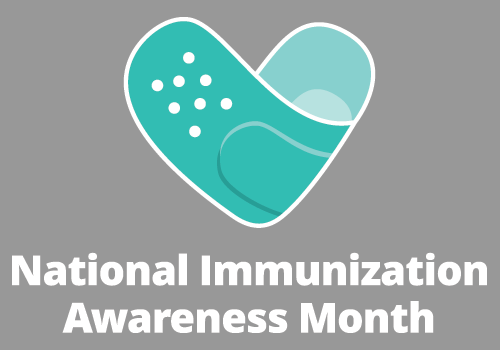August is National Immunization Awareness Month—a time to spotlight the critical role of vaccines in preventing infectious disease and addressing new pandemic threats.
During National Immunization Awareness Month, Vaccinate Your Family (VYF) is highlighting how vaccines have changed the world—and the tragic outcomes when people don’t get vaccinated.
Here’s a look at how vaccines have saved lives—and why vaccine hesitancy and misinformation are one of the biggest health threats in the U.S.
How vaccines have changed the world

Before the development of vaccines, illnesses like the flu, polio, measles, and whooping cough, to name a few, could be death sentences for children and adults alike.
However, routine immunization has saved billions of lives.
As Vaccinate Your Family (VYF) explains, “Before vaccines, there were more than 500,000 cases of measles reported every year in the U.S. In 2020, there were 13.”
In the United States alone, according to VYF, routine immunization prevents 10.5 million cases of infectious disease per year and 2,685 hospitalizations per day. In addition, vaccines save 33,000 lives per year and 720 early deaths per week.
Those numbers are astounding, to say the least, and show how far science has come to improve and save human life.
COVID-19 vaccine saved 20 million lives
The COVID-19 vaccine, for its part, prevented a projected “14.4 million… deaths from COVID-19 in 185 countries and territories between Dec 8, 2020, and Dec 8, 2021,” according to a study published in The Lancet. When researchers “used excess deaths as an estimate of the true extent of the pandemic,” the figure jumps to 19.8 million, as Bio.News previously reported.
The development of the COVID-19 vaccine was a watershed moment in the history of medicine. This was not only because of the speed in which the vaccine was developed, but also because it was the breakthrough point for mRNA technology—which had been researched for decades prior to its deployment during the pandemic.
Thanks to the lessons learned on vaccine development during the COVID-19 pandemic, developing the next pandemic vaccine in 100 days is “extraordinarily possible,” said Novavax’s Chief Business Officer John Trizzino:
[embedyt] https://www.youtube.com/watch?v=j5a_we8qm_k[/embedyt]
National Immunization Awareness Month campaign highlights cost of not getting vaccinated
By all accounts, we are living in a golden age of vaccine technology. However: “Rates of routine childhood vaccination (against diseases such as measles, polio, and meningococcal disease) have fallen over the course of the COVID-19 pandemic,” according to Vaccinate Your Family (VYF).
U.S. Food and Drug Administration (FDA) Commissioner Dr. Robert M. Califf told the BIO International Convention in June that medical misinformation is the leading cause of death in the United States.
VYF’s Their Best Shot campaign aims to “reignite a culture of immunization” by focusing on the benefits of routine immunization for children and combating misinformation. “In some cases, even a small drop in the vaccination rate can lead to outbreaks of disease,” says VYF.
The cost of not vaccinating can be high. To encourage families to get vaccinated, VYF is sharing real patients’ stories—like Evan, who caught a deadly form of meningitis.
“I didn’t realize that bacterial meningitis, especially the meningococcal meningitis that Evan had, was much more deadly,” his mother recalled. “My husband and I drove the 3 hours to Evan, not knowing if he would be alive when we got there. We stopped mid-way to call the hospital to check his condition.”
Unfortunately, their son died after weeks of treatment.
“After Evan died, we found out to our astonishment that a vaccine was available, a vaccine that would have saved Evan’s life. Not a new vaccine, but one used very successfully and safely by the military to control meningitis outbreaks for over 30 years,” his mother continued. “If we had known about this vaccine, Evan would have received it and Evan would be here today.”
Another story told how one elderly couple’s decision not to get the COVID-19 vaccine cost them their lives.
“Married for 54 years, Dwight and Brenda loved spending time with their family, especially their grandchildren and great-grandchildren,” their son Windell wrote on the Vaccinate Your Family website. “Because they lived in a small town, they didn’t think COVID was a threat to them and decided not to get vaccinated. Sadly, they ended up hospitalized and lost their lives to COVID within one day of each other in August 2021.”
“I want folks to think twice about not getting vaccinated because COVID is a real risk. The doctors told me that if my parents had been vaccinated, they probably would have pulled through. Instead, I lost both of my parents to COVID within 24 hours,” said Windell.
The ‘movable middle’
In light of the recent uptick in vaccine hesitancy, especially during the COVID-19 pandemic, there is a lot of work to do to improve immunization numbers in the United States.
“The hesitant or reluctant communities are not a lost cause,” said Charley John, Director of U.S. Public Policy at Walgreens, during the BIO International Convention in June. “Successfully campaigning around vaccinations came down to working with the movable middle.”
“There are communities who will get vaccinated no matter what and communities who will always out and out refuse,” added Angela Shen, MPH Captain (Ret.) of the U.S. Public Health Service. “But there is a much larger community of people in the movable middle. That is who we need to work with and education to get ourselves to the levels of vaccine saturation we want to be at.”
This is why awareness activities, like August’s National Immunization Awareness Month and Vaccinate Your Family’s campaign, are so important to help communities understand the importance of vaccines and their role in a healthier, happier future for all.
Watch: BIO’s Phyllis Arthur discusses COVID-19 vaccine technology and how we can overcome vaccine hesitancy:




